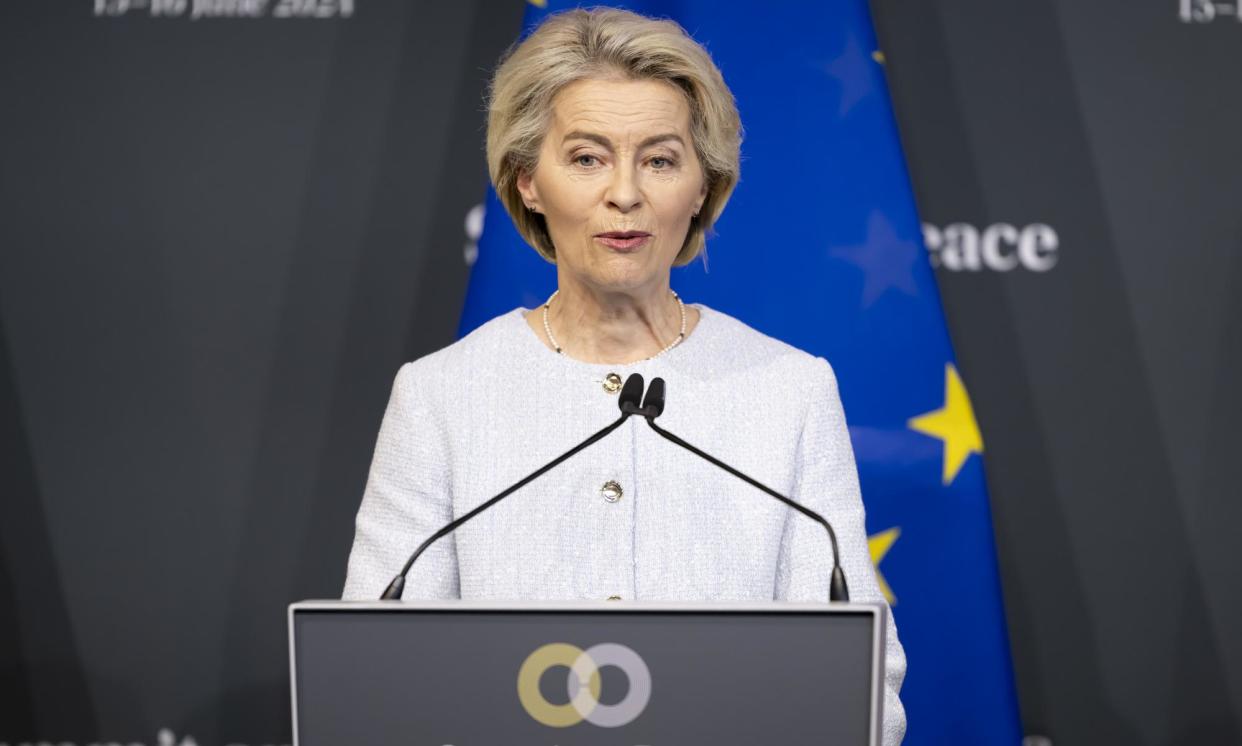Ursula von der Leyen on track to keep job after EU elections boost

Ursula von der Leyen is on track to remain for a second term as president of the European Commission, as EU leaders meet on Monday for a first discussion on divvying up the bloc’s top jobs.
The EU’s 27 heads of state and government will gather for dinner in Brussels in their first group meeting since European elections last week boosted nationalist and far-right parties and triggered Emmanuel Macron to call snap elections in France.
At stake is whether von der Leyen receives a second five-year term as head of the commission, which initiates and enforces EU law. EU leaders will also decide on successors to Charles Michel, the president of the European Council, and Josep Borrell, the EU’s top diplomat.
Von der Leyen has long been the clear frontrunner. As the lead candidate for the centre-right European People’s party, which will be the largest group in the new European parliament with 26% of the seats, her position has been strengthened by the Europe-wide vote.
Macron’s election gamble, widely seen as a move that will distract the French president from European affairs, is also viewed as helping her cause. Macron had previously appeared to flirt with replacing von der Leyen with the former Italian prime minister Mario Draghi, but diplomats are now expecting France to fall into line.
The first round of France’s parliamentary elections is on 30 June, after an EU summit on 27-28 June that is intended to finalise the EU’s senior roles. The appointment process “might be easier than it usually is”, said one EU diplomat. “The thinking is that the French have so much chaos at home they might want to spend less time on this.”
Others suggested that gains for the far right in France meant it less likely that Macron would choose a technocratic candidate, such as Draghi, a former president of the European Central Bank.
“I don’t see a realistic alternative,” said a second diplomat, speaking of von der Leyen. “For all the French spin about Draghi … there is no alternative and, unlike 2019, no stalemate that Macron or anyone else can use to their advantage.”
During the last round of EU appointments in 2019, leaders of France, Germany and Italy meeting on the sidelines of the G7 in Japan settled on the former Dutch foreign minister Frans Timmermans to lead the commission, only to see the deal quickly unravel at an EU summit in Brussels.
Consensus is also firming around Portugal’s Socialist former prime minister António Costa to take over from Michel in chairing EU Council meetings. Costa, who won three successive terms as prime minister, resigned last year over a corruption scandal. But EU leaders appear ready to take the word of socialist grandees that it will not be a problem. Doubts about the case against Costa have also emerged following reports that prosecutors made an error when they transcribed Costa’s name in a wiretap, apparently confusing him with a minister with a similar name.
The Danish prime minister, Mette Frederiksen, has been rumoured to be an alternative choice, but diplomats say her hardline stance on migration means she is not favoured by her European socialist group. Costa is well-liked by EU leaders and ticks the box of being from southern Europe, diplomats say. His age is seen as an advantage as it is perceived that he is less likely to be using the position as a stepping stone to another big job.
Estonia’s prime minister, Kaja Kallas, is a favourite to take over from Borrell as the EU’s chief diplomat. Concerns she is too “mono-thematic” on Russia and less interested in Europe’s foreign policy elsewhere in the world have ebbed. She would also ensure central and eastern Europe are represented in the final puzzle.
Related: ‘This could end up ugly’: after Macron’s gamble, will the far right seize power in France?
Diplomatic sources said an early deal confirming von der Leyen’s nomination on Monday could not be ruled out, although leaders will also want to tie their support to their chances of getting prestigious portfolios in the commission. France and Italy are angling for big economic jobs at the EU executive; Spain wants its environment minister, Teresa Ribera, to be put in charge of EU climate and nature policy.
Malta’s Roberta Metsola is expected to get another term as president of the European parliament, although that decision falls to MEPs when they meet in mid-July.
Once the parliament has elected its speaker and filled other senior posts, MEPs will have the final say in confirming the next commission president. In a vote pencilled in for 18 July, von der Leyen or another appointee will have to win the votes of 361 of the 720 MEPs.


